英语语法-现在完成时讲解培训资料
- 格式:doc
- 大小:22.50 KB
- 文档页数:3
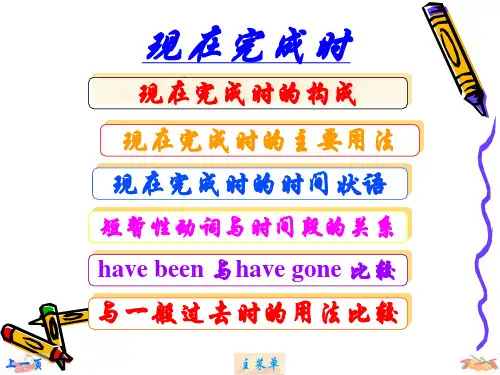
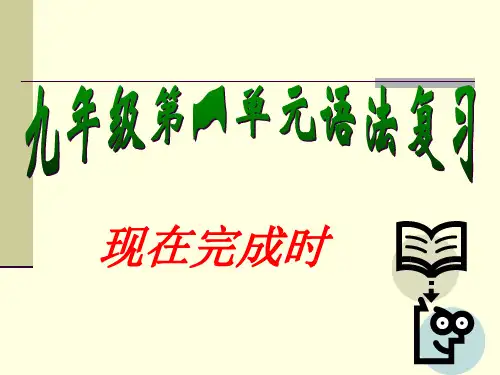

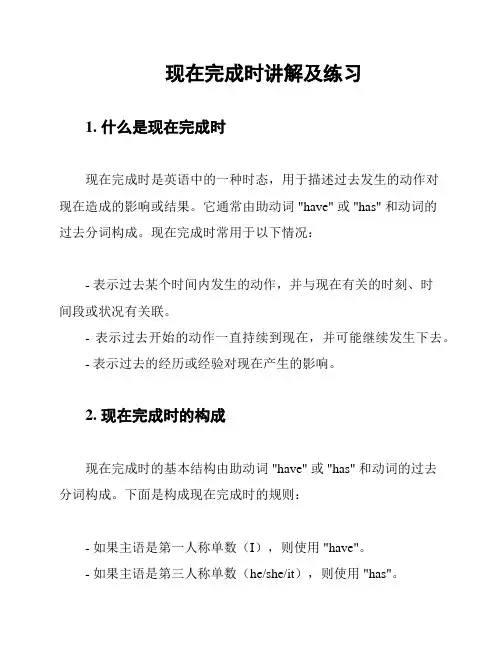
现在完成时讲解及练习1. 什么是现在完成时现在完成时是英语中的一种时态,用于描述过去发生的动作对现在造成的影响或结果。
它通常由助动词 "have" 或 "has" 和动词的过去分词构成。
现在完成时常用于以下情况:- 表示过去某个时间内发生的动作,并与现在有关的时刻、时间段或状况有关联。
- 表示过去开始的动作一直持续到现在,并可能继续发生下去。
- 表示过去的经历或经验对现在产生的影响。
2. 现在完成时的构成现在完成时的基本结构由助动词 "have" 或 "has" 和动词的过去分词构成。
下面是构成现在完成时的规则:- 如果主语是第一人称单数(I),则使用 "have"。
- 如果主语是第三人称单数(he/she/it),则使用 "has"。
- 其他所有人称(一般为复数形式)使用 "have"。
动词的过去分词形式主要有三种:- 以 "-ed" 结尾的动词,如 "worked"。
- 不规则动词过去分词,如 "gone"。
- 部分动词过去分词与原形一样,如 "put"。
3. 现在完成时的使用示例表示过去某个时间内的动作- I have traveled to many countries.(我去过很多国家。
)- She has read five books this month.(她这个月读了五本书。
)表示持续到现在的动作- They have lived in this city since 2005.(他们从2005年开始就一直住在这个城市。
)表示过去的经历对现在的影响- I have studied English for many years, so now I can speak it fluently.(我学了很多年英语,所以现在我能够流利地说它。
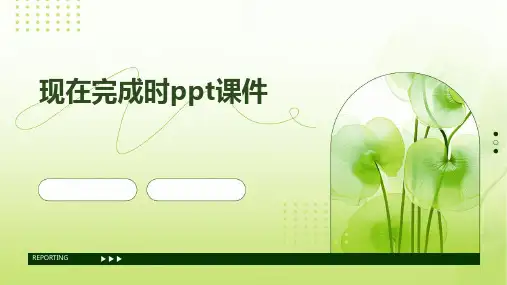
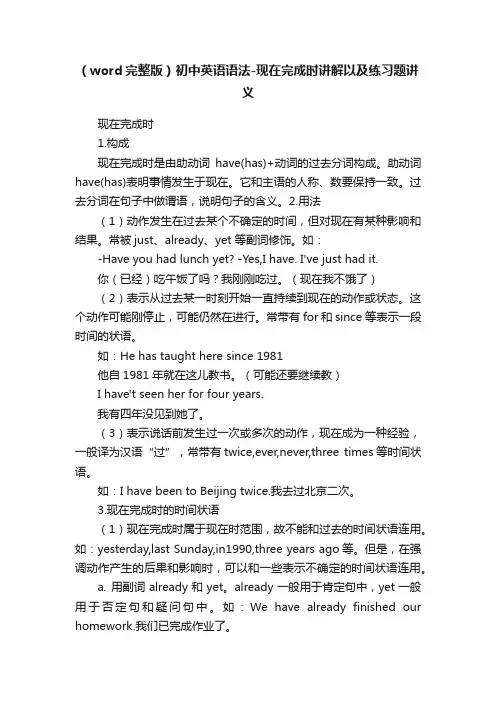
(word完整版)初中英语语法-现在完成时讲解以及练习题讲义现在完成时1.构成现在完成时是由助动词have(has)+动词的过去分词构成。
助动词have(has)表明事情发生于现在。
它和主语的人称、数要保持一致。
过去分词在句子中做谓语,说明句子的含义。
2.用法(1)动作发生在过去某个不确定的时间,但对现在有某种影响和结果。
常被just、already、yet 等副词修饰。
如:-Have you had lunch yet? -Yes,I have. I've just had it.你(已经)吃午饭了吗?我刚刚吃过。
(现在我不饿了)(2)表示从过去某一时刻开始一直持续到现在的动作或状态。
这个动作可能刚停止,可能仍然在进行。
常带有for和since等表示一段时间的状语。
如:He has taught here since 1981他自1981年就在这儿教书。
(可能还要继续教)I have't seen her for four years.我有四年没见到她了。
(3)表示说话前发生过一次或多次的动作,现在成为一种经验,一般译为汉语“过”,常带有twice,ever,never,three times等时间状语。
如:I have been to Beijing twice.我去过北京二次。
3.现在完成时的时间状语(1)现在完成时属于现在时范围,故不能和过去的时间状语连用。
如:yesterday,last Sunday,in1990,three years ago等。
但是,在强调动作产生的后果和影响时,可以和一些表示不确定的时间状语连用。
a. 用副词already和yet。
already一般用于肯定句中,yet一般用于否定句和疑问句中。
如:We have already finished our homework.我们已完成作业了。
They haven't finished their homework yet.他们还没有完成作业。


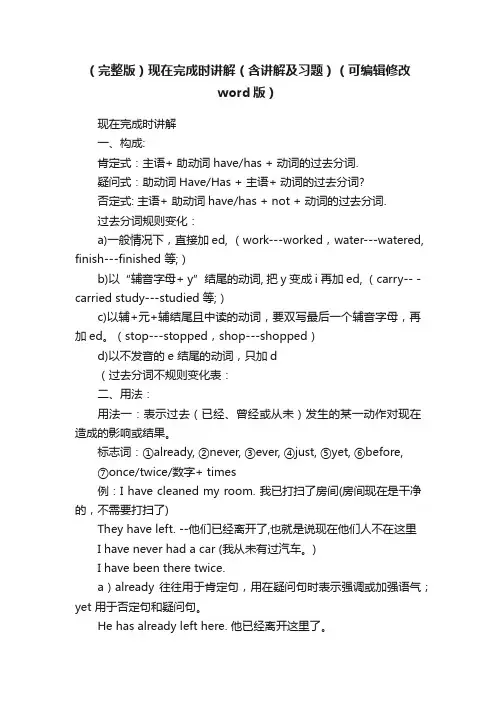
(完整版)现在完成时讲解(含讲解及习题)(可编辑修改word版)现在完成时讲解一、构成:肯定式:主语+ 助动词have/has + 动词的过去分词.疑问式:助动词Have/Has + 主语+ 动词的过去分词?否定式: 主语+ 助动词have/has + not + 动词的过去分词.过去分词规则变化:a)一般情况下,直接加ed, (work---worked,water---watered, finish---finished 等;)b)以“辅音字母+ y”结尾的动词, 把y 变成i 再加ed, (carry-- -carried study---studied 等;)c)以辅+元+辅结尾且中读的动词,要双写最后一个辅音字母,再加ed。
(stop---stopped,shop---shopped)d)以不发音的e 结尾的动词,只加d(过去分词不规则变化表:二、用法:用法一:表示过去(已经、曾经或从未)发生的某一动作对现在造成的影响或结果。
标志词:①already, ②never, ③ever, ④just, ⑤yet, ⑥before,⑦once/twice/数字+ times例:I have cleaned my room. 我已打扫了房间(房间现在是干净的,不需要打扫了)They have left. --他们已经离开了,也就是说现在他们人不在这里I have never had a car (我从未有过汽车。
)I have been there twice.a)already 往往用于肯定句,用在疑问句时表示强调或加强语气;yet 用于否定句和疑问句。
He has already left here. 他已经离开这里了。
Has he already left here? 他(真的)已经离开这里了吗?(表示加强语气)My teachers haven’t had breakfast yet. 我的老师们还没有吃早饭。

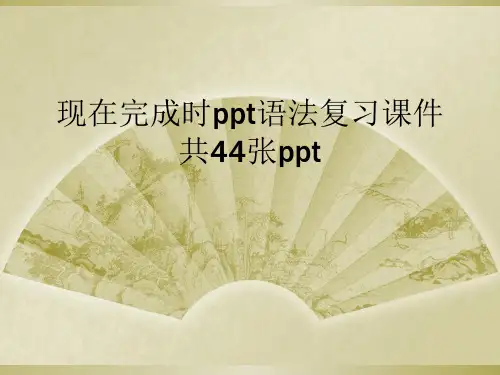
现在完成时的讲解基本结构:主语+have/has+过去分词(done)①肯定句:主语+have/has+过去分词+其他②否定句:主语+have/has+not+过去分词+其他③一般疑问句:Have/Has+主语+过去分词+其他④特殊疑问句:特殊疑问词+一般疑问句(have/has+主语+过去分词+其他)(1)现在完成时用来表示现在之前已发生过或完成的动作或状态,但其结果却和现在有联系,也就是说,动作或状态发生在过去但它的影响现在还存在.I have spent all of my money.(含义是:现在我没有钱花了.)Jane has laid the table.(含义是:现在桌子已经摆好了.)Michael has been ill.(含义是:现在仍然很虚弱)He has returned from abroad. (含义是:现在已在此地)(2)现在完成时可以用来表示发生在过去某一时刻的,持续到现在的动作(用行为动词表示)或状态(be动词表示)常与for(+时间段),since(+时间点或过去时的句子)连用.Mary has been ill for three days.I have lived here since 1998.注(超重要):瞬间动词(buy,die,join,lose……)不能直接与for since 连用。
要改变动词 come-bego out-be outfinish-be overopen-be opendie-be dead………………1.have代替buyMy brother has had(不能用has bought) this bike for almost four years.2、用keep或have代替borrowI have kept(不能用have borrowed) the book for quite a few days.3、用be替代becomeHow long has your sister been a teacher?4、用have a cold代替catch a coldTom has had a cold since the day before yesterday.5、用wear代替put onb)用“be+形容词”代终止性动词1、be+married代marry2、be+ill代fall (get) ill3、be+dead代die4、be+asleep代fall (get) asleep5、be+awake代wake/wake up6、be+gone代lose,die,sell,leave7、be+open代open 8、be closed代close/shut9、be+missing(gone,lost)代losec)用“be+副词”代终止性动词1“be+on”代start,begin2“be+up”代get up3“be+back(to)”代return to,come back to,go back to4“be here (there)”代come(arrive,reach,get) here或go (arrive,reach,get) there等等d)用“be+介词短语”代终止性动词1.“be in/at +地点”代替go to /come to2.用be in the army 代替join the army3.“be in/at +地点”代替move to常用瞬间动词变延续性动词表:1. have arrived at/in sw. got to/reached sw. come/gone/moved to sw.→have been in sw./at…相应的介词2. have come/gone back/returned → have been back3. have come/gone out →have been out4. have become → have been5. have closed / opened→ have been close/open6. have got up → have been up;7. have died → have been dead;8. have left sw. → have been away from sw.9. have fallen asleep/got to sleep → have been asleep;10. have finished/ended/completed → have been over;11. havemarried → have been married;12. have started/begun to do sth. → have done sth. ;13. have begun → have been on14. have borrowed/bought →have kept/had15. have lost → haven’t had16. have put on →have worn17. have caught /get a cold → have had a cold;18. have got to know → have known19. have/has gone to → have been in20. have joined/have taken part in the league/the Party/the army→have been a member of/ have been in/have been the Party’s member/the league member/the soldier…注意: 1.现在完成时不能单独与准确时间连用,(如表示过去的时间状语)如yesterday(morning、afternoon),last(morning、afternoon)等,除非与for,since连用.2.现在完成时往往同表示不确定的过去时间状语连用,如already(肯定), yet(否定,疑问), just, before, recently,still, lately等:He has already obtained a scholarship.I haven't seen much of him recently (lately).We have seen that film before.Have they found the missing child yet ?3. 现在完成时常常与表示频度的时间状语连用,如often, sometimes, ever, never, twice, on several occasion等:Have you ever been to BeijingI have never heard Bunny say anything against her.I have used this pen only three times. It is still good.George has met that gentleman on several occasions.4. 现在完成时还往往可以同包括现在时间在内的时间状语连用,如now, up to these few days/weeks/months/years, this morning/week/month/year, just, today, up to present, so far等:Peter has written six papers so far.Man has now learned to release energy from the nucleus of the atom.There has been too much rain in San Francisco this year.The friendly relations and cooperation between our two countries have been enhanced inthe past few years.Up to the present everything has been successful.5. 现在完成时还可以用来表示过去的一个时间到现在这段时间内重复发生的动作.We have had four texts this semester.6.现在完成时的"完成用法"现在完成时的"完成用法"指的是动作发生在过去某一时刻并已结束,但该动作对现在产生了影响,与现在情况具有因果关系。
八年级下册必考知识点---现在完成时现在完成时(I)语法知识定义:(1)表示过去发生或已经发生的动作对现在造成的影响或结果,这个影响和结果对现在还必须存在.常与already(已经), yet(已经,还), just(刚刚),ever(曾经),never 等词连用.常用于肯定句或疑问句(均表示:已经).常用于否定句(表示:还、尚),疑问句末尾(表示:已经).现在完成时的构成及句型结构:(注:过去分词的变化分规则变化与不规则变化,规则变化与动词原形变过去式一样,不规则变化见教材最后面)1.肯定句:主语+have/has+过去分词+其他+时间.eg: I have already lost the key. 我已经弄丢了钥匙. (我现在没有钥匙) He has ever read that book . 他曾经看过这本书. (了解书的内容)They have just cleaned their hands. 他们刚刚洗过手了. (手是干净的)2.否定句:主语+haven’t/ hasn’t+过去分词+其他+时间.eg: I haven’t lost the key yet.He hasn’t ever read that book .They haven’t just cleaned their hands.3.一般疑问句:Have/Has+主语+过去分词+其他+时间?肯定回答:Yes, 主语+have/ has. 否定回答:No, 主语+haven’t/hasn’t. eg: Have you already lost the key? Yes, I have. No, I haven’t. Has he ever read the book? Yes, he has. No, he hasn’t.Have they just cleaned their hands? Yes, they have. No, they haven’t.4.特殊疑问句:特殊疑问词+have/has+主语+过去分词+其他+时间?eg: What have you already done? (done是do/does的过去分词)What has he ever done?What have they just done?定义:(2)现在完成时表示从过去开始一直持续到现在还有可能继续持续下去的动作或状态。
第六讲现在完成时
1.概念:
1)、表示动作或状态在过去已经开始, 持续到现在, 也许还要持续下去,常和for, since, 连用, 表示持续的动作或状态多为延续性动词.
eg: We have lived here since 2000.
自从2000年以来我们一直住在这里. ( 说明一直住在这里, 也许还会住下去. )
She has worked in Nanning for five years.
She has been ill for a week.
2)表示过去发生的或已经完成的某一动作对现在造成的影响或结果.
eg: I have lost my pen. 我把钢笔弄丢了. ( 过去某时丢的, 现在还没有找到)
I have already watched the TV play. 我已经看过这部电视剧了.
--- Have you had your lunch yet ? 你吃过午饭了吗?
--- Yes, I have just had it. 是的, 我刚吃过. ( 说明现在饱了)
2. 结构: 主语+ have / has + done + …
3. 句型: ⑴肯定句: ①主语+ have / has + done + …
eg:She has been to Shanghai. 她去过上海.
I have finished doing my homework. 我已经完成我的作业了.
⑵否定句: ①主语+ have / has + not +done + …
eg:I haven’t seen this film. 我没有看过这部电影.
eg:She hasn’t finished doing his homework. 她还没有完成她的作业.
⑶一般疑问句:① Have / Has + 主语+ done + …
eg: Have you seen this film ? Yes, I have. / No, I haven’t .
你看过这部电影吗? 是的, 看过. / 不, 没有.
eg:Has she finished do ing his homework ? Yes, she has . / No, she hasn’t.
她完成她的作业了吗? 是的, 完成了. / 不, 没有.
⑷特殊疑问句:①特殊疑问词+ have / has + 主语+ done + …
eg: When has you seen this film ? 你什么时候看的这部电影?
eg: Who has finished doing his homework ? 谁完成了作业?
4. 时间状语:典型的表时间的词与现在完成时连用,这些词有:
for 、since、already、yet、ever、never、recently、just、before、so far、by now、…
等连用.
注意: for+一段时间since+过去的某一个时间点
I have lived in Nanning for ten years.
I have lived in Nanning since ten years ago/ 2002.
I haven’t eaten anything for ten hours.
I ha haven’t eaten anything since 6am.
already :用于肯定句, 可放在助动词之后、过去分词之前,也可放在句末.
I have already finished my homework.
yet: 用在疑问句中意为”已经”, 用在否定句中表示”还”, 常放在句末.
Have you finished your homework yet?
I haven’t finished my homework yet.
ever: 曾经用于疑问句中:
Have you ever been to Beijing?
Have you ever been to Shanghai ? 你去过上海吗?
never: 未曾从未
I have never traveled by plane before. 我以前从来没有乘飞机旅行过.
recently:最近用于肯定否定疑问句中
I have been busy recently.
We have not seen Tom recently.
Have they been here recently.
eg: I have just seen Tom.
I haven’t heard of it before. 我以前从来没有听说过这件事.
They have planted 2000 trees so far.
The child has learned 100 English words by now.
5. 当与一段时间连用时, 经常用for 加一段时间, 这时候谓语动词一定要用延续性的.
非延续性动词----延续性动词
改错:They have got married for ten years. I have borrowed this book for a week.
get married--- be married borrow --- keep
come ---- be here go --- be away / off buy --- have
start / begin --- be on leave --- be away die --- be dead
arrive---be in/at join---be in /be a member of stop---be over
return----be back open/close---be closed/open
eg: He came here three days ago. 他三天前来的这. (一般过去时)
He has been here for three days. 他来这已经三天了.
(现在完成时与一段时间连用, 非延续性动词变延续性动词. )
He went to Dalian last week. 他上周去的大连. ( 一般过去时)
He has been away for a week. 他已经离开有一周了. ( 现在完成时)
I bought the book last month. 我去年买的这本书. ( 一般过去时)
I have had the book for a month. 我保管这本书有一周了. ( 现在完成时)
The football match started an hour ago.
The football match has been on for an hour.
6. 词义辨析
have been to 曾经去过某地,说话时已经从某地回来或者已从该地去了其他的地方。
eg: I have been to Canada. 我去过加加拿大.
have gone to 已经去了某地,书说话时还未回来。
eg: He has gone to Dalian. 他去了大连.
have been in 已在某地待了多久,大地方用in 小地方用at, 后面是副词则不用介词The Greens have been in China for two years.
7. 现在完成时与一般过去时的区别:
1)、侧重点不用,现在完成时是与现在有关的时态,侧重于过去的动作对现在造成影响,
而一般过去时是一种过去的时态,侧重于表示过去的动作,与现在无关。
I went the zoo yesterday. 尽说昨天去了动物园,与现在无关。
Li lei has read the book. 说明李雷理解那本书。
2)、与现在完成时连用的时间状语有:for 、since、already、yet、ever、never、recently、just、before、so far、by now、而一般过去时则常与yesterday, ago last, in 20000, just now, 连用。